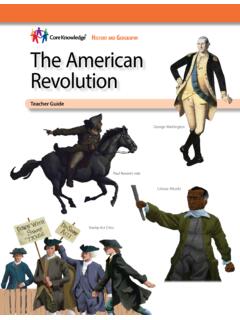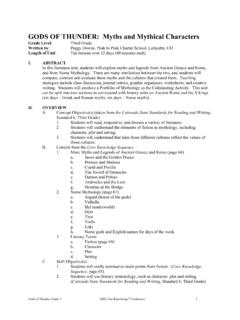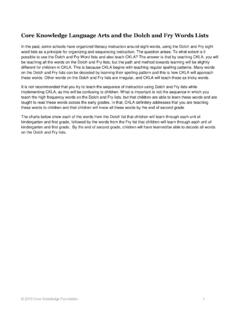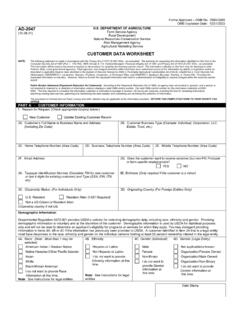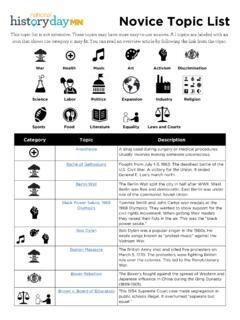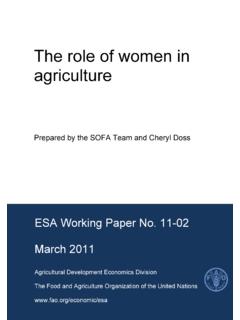Transcription of Causes of the Latin American Independence Movement
1 1 Revolutions in AmericaCauses of the Latin American Independence MovementThe American Revolution created a ripple effect in both the Western and Eastern hemispheres. Inspired by the Americans successful campaign for Independence and by the great thinkers of the Enlightenment among them, John Locke and the Baron de Montesquieu other revolutions in Europe and Latin America emerged as a way to secure Independence and upend the rigidity of the preexisting social structure. Foreign InfluencesNumerous foreign influences inspired and fueled the Latin American Independence American RevolutionFollowing the French and Indian War, the British colonies came under increased scrutiny by Parliament.
2 The colonists grew increasingly dissatisfied with their relationship with Great Britain. Taxation without representation and various other abuses by the British Crown led many colonists to the conclusion that action must be taken. As the author of the Declaration of Independence , Thomas Jefferson drew inspiration from Enlightenment thinker John Locke s concept of natural rights. While Locke contended that all people have the right to life, liberty, and property, Jefferson adapted his words to include in the Preamble of the Declaration of Independence , stating that all men are entitled to certain natural rights, including Life, Liberty, and the pursuit of Happiness.
3 Jefferson further expanded upon Locke s conception of the social contract by explaining that governments are instituted among Men for the purpose of protecting such rights, and That whenever any Form of Government becomes destructive to these ends, it is the Right of the People to alter or to abolish it, and to institute new Government. This momentous document marked the beginning of the United States s seven-year fight for Independence from Great Britain. The success of the former British colonies in asserting their Independence from the most powerful country in the world proved formative for other Independence movements around the globe, especially in France and, shortly after, in Ancien R gimeThe ancien r gime, or old order, refers to the social and political order that existed in France from the late Middle Ages until the French Revolution.
4 Under this system, all men were subjects of the king of France, who ruled as an absolute monarch. The king s subjects were organized into three social classes known as the Three Estates. Each Estate was considered an institution, with its own entitlements and privileges. The First Estate the highest level of the feudal class system was the clergy. Before the French Revolution, there were approximately 130,000 members of the First Estate. The clergy s wealth was a product of taxes and tithes paid by the commoners. Many clergy lived extravagantly, similar to the nobles of the Second Estate.
5 Yet, despite their social and political dominance, they only made up percent of the population of France during the ancien r Second Estate the next highest level of the feudal class system was the nobility, or aristocracy. The nobility was the wealthiest of the three social classes. Like the clergy, the nobles amassed wealth through taxation of the lower class. They were landowners, and land renters, collecting rent from their tenants. They also did not have to pay taxes. The Third Estate the lowest level of the feudal class system included every French commoner who did not have a noble title and was not ordained through the Church.
6 This amounted to 27 million people, or 98 percent of the nation. The Third Estate was enormous, but it had no power in the feudal system. It contained penniless beggars and wealthy merchants, laborers and artisans, farmers and city dwellers. Though much of the Third Estate comprised poor people, a middle class emerged. Known as the bourgeoisie, they were the business owners and professionals who were able to make enough money to live with relative comfort. As they became successful in their professions, many were eager to acquire the status of those in the Second Estate.
7 A few could purchase noble status, but by the 1780s, even that was out of reach of their financial pockets. The bourgeois became frustrated. They were the economic developers of the nation, they were the ones making profit for the nation, yet they had no control in the running of it. The Enlightenment ideals that were floating around the salons of Paris soon came to the attention of the bourgeois, and they liked what they Changes in FranceBy the mid-1780s, France had reached a crossroads. The extravagance of the French monarchy and the aid given to the Americans during the American Revolution placed France in financial disarray.
8 To make matters even worse, the country had suffered twenty some years of poor harvests and livestock disease that caused agricultural commodities to skyrocket, most notably, rendering the cost of a loaf of bread a staple in the diets of many members of the Third Estate entirely unrest among the nobility and the poor alike led King Louis XVI to call a meeting of the Estates-General the Three Estates to discuss financial reform at the Palace of Versailles in May 1789. Though accounting for the majority of France s population, the Third Estate had little say at the meeting, and its leaders were overruled by the First and Second Estates.
9 This led to an increased demand by the middle class for government reform and equitable treatment with the other social classes. The Third Estate was soon joined by members of the nobility, leading to the formation of the National Assembly, a new governing body for France. The National Assembly began work on a new constitution that limited the power of the French monarch and adopted the articles of the Declaration of the Rights of Man in August 1789. The document drew inspiration from Enlightenment thinkers and played a significant role in inspiring the Haitian Revolution that would begin two years many, these reforms were long overdue and a welcome change.
10 To others, however, the political upheaval fomented hysteria. Shortly after the formation of the National Assembly, rumors of a military coup incited riots in Paris, including the storming of the Bastille for munitions and supplies. The French Revolution became increasingly radical as it progressed into the 1790s and entered a period known as the Terror in 1793, during which political parties and individuals jockeyed for power through a campaign of intimidation and extreme violence. The French Revolution effectively came to an end in 1799 with the rise of Napoleon ClassesLatin America had a highly rigid social class system with Spanish and Portuguese colonists at the top and poor indigenous peoples and enslaved Africans at the bottom, similar to social class systems in other parts of the world at this time.
